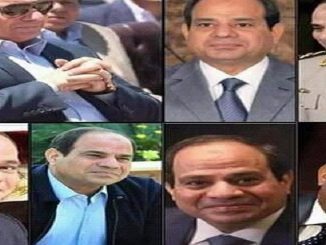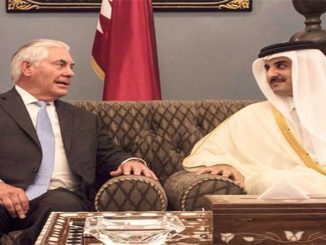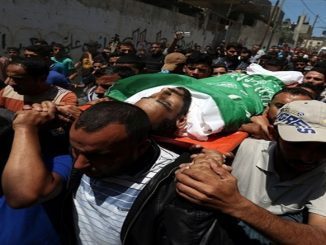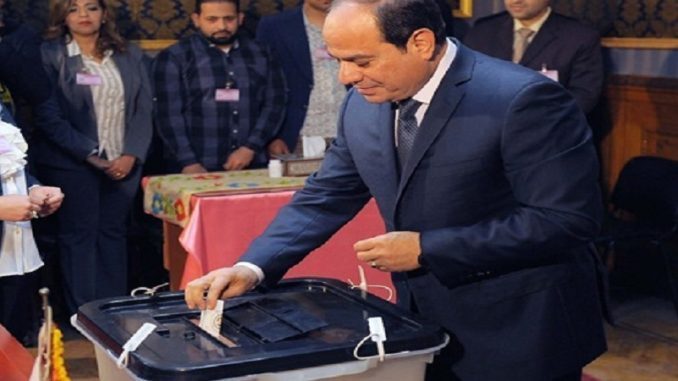
Despite al-Sisi’s certain victory a sweeping victory in the absence of real competition, in a contest dismissed by critics as a shame, much has been said about the importance of securing a high turnout.
Preparing to embark on his second presidential term after the election results, widely presumed to be predetermined, Sisi has called on citizens to head to the polls in order to send a message to the world.
Credible challengers either were arrested or dropped out citing intimidation and other pressures ahead of the presidential election — Egypt’s third since the 2011 Arab Spring uprising that ousted President Hosni Mubarak. Al-Sisi’s only opponent entered the race at the 11th hour and is widely viewed as a stooge running to give a democratic veneer to the election and prevent the vote from becoming a referendum on the president’s capabilities.
Warning the Egyptians with Fines
In an effort to enthuse voters, the state news agency said to the Egyptians that voting is mandatory. Egypt’s National Election Authority has warned that eligible voters who do not vote in the ongoing presidential election will be fined 500 Egyptian pounds ($28), the state-run Channel One TV reports.
More than 59 million Egyptians are eligible to vote in the three-day presidential election that began on 26 March.
“I expect turnout and participation to increase in the coming hours, and I call on Egyptians to go out and vote,” said Prime Minister Sherif Ismail.
Turnout was light in many parts of Cairo. Reuters, citing an official in the National Election Authority, said about 13.5 percent of 59 million eligible voters had cast ballots on Monday.
“Sisi’s expected victory appears likely to tighten his grip on the government, politics, and society, making him perhaps the most controlling leader in Egypt’s modern history,” said the New York Times.
“But it will also raise the expectations of Egypt’s more than 100 million people, most of them living in poverty. While the economy is showing signs of a rebound, severe austerity measures, rising prices and lowered subsidies have worsened the lives of a majority of Egyptians, including the middle class.”
“Much like Russia’s Vladimir Putin, Sisi cares greatly about turnout. In the wake of the 2013 military coup that brought him to power, Sisi successfully styled himself as the savior of the nation, the steady hand who would bring stability back to the country while ruthlessly quashing Islamist dissent, “according to the Washington Post.
But in recent years, as terror threats persisted and the economy still struggled, his mystique has worn thin. A strong showing at the polls would help buttress his legitimacy.
Sisi and his supporters employed rather conspicuous methods to get out the vote. “Sisi and his team aren’t counting on the power of his charisma to mobilize turnout,” said Timothy Kaldas, a Cairo-based analyst with the Tahrir Institute for Middle East Policy, to the Wall Street Journal. Instead, he said, the government turned to “Mubarak-era infrastructure to get people to the polls.”
That included rather tactless forms of coercion. “In the southwestern New Valley province, the governor announced a contest in which public services valued at more than $113,000 would be provided to three districts with the highest voter turnout, as long as more than three-quarters of the voters cast ballots in those areas, “reported the Journal’s, Jared Maslin.
“The regional government plans to build a new playground, nursery or event hall in the top three districts, the state news agency said.” Similar promises were proffered in other parts of the country.”
Wages for Ink Stained Fingers
Officials working in a number of state institutions have put measures in place to ensure employees’ participation in the 2018 presidential election. Several companies divided their workforce into three groups, with each going to vote on one of the three election days, in order to guarantee that employees’ trips to the polls do not hamper productivity.
Management at the state-owned Petrotrade company had the employees whose turn it was to go to the polls sign in their attendance to work in the morning, then head to cast their votes, said Salma, an employee at the company.
The employees were told that their time away from the workplace would only be counted as a paid workday if they proved their vote by showing their ink-stained fingers. Phosphorous ink is used in polling stations across the country to ensure that no one votes twice.
Throughout the past few weeks, the company encouraged its employees to attend events organized by the Sisi campaign. Members of staff were offered an out-of-office work assignment wage for two days if they attended the events, Salma said. However, employee attendance at the last conference held before voting began was obligatory, she added.
Meanwhile, Samy, who works in the Zagazig Public Hospital, said that the local health directorate notified management at several public hospitals to divide doctors into two groups to go vote, with each group heading to the polls on either the first or second day of voting.
A representative from a local education directorate in Gharbiya was filmed threatening to cut teachers’ wages during the three-day election period if they could not prove that they voted, given that schools had assigned these days as paid leave.
In a video circulated on Facebook on Monday, the representative tells teachers that they must print the phosphorous ink from their fingertips directly onto cards distributed to them by the education directorate. These cards should then be sent to the directorate so authorities there can track the teachers who cast their votes.
The representative was also caught on tape saying that these procedures are per state instructions and reminded the teachers that participating in the election sends a message to the world that “Egypt has civilization, culture, and total freedom.”
A copy of an alleged administrative order issued by Al-Azhar’s central administration office in Qalyubia was also circulated on social media in the days before the election, which stated that all employees affiliated to the institution would also be divided into three groups, each casting their ballot on a separate day.Employees would also have to evidence their vote by showing their ink-stained fingers, according to the order.
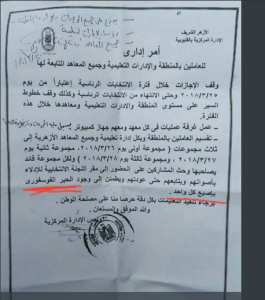
Muslim citizens were also told they would be eligible for religious trips to Saudi Arabia if the turnout exceeded 40 percent in their areas.
The Coptic Church Rally Their Voters
The Coptic Orthodox Church also called on Christians to participate in the presidential election, reported Egypt Today.
Pope Tawadros II of Alexandria and the Patriarch of the See, St. Mark, cast his ballot early on the first day of voting in the polling station set up in the closest school to the Cathedral of Abbasiya. He also urged Egyptians to “fulfil their duty” by taking part in the presidential election.
Also, the deputy head of the Coptic Orthodox Church of Alexandria, Royas Markes, cast his vote on the second day of the election, stating to Egypt Today that “voting in the election is the biggest proof of patriotism and those who abstain from voting are traitors to their country.
Bishop Daniel, of the churches of Maadi, El Basatin, and Dar El Salam, also cast his ballot on the second day of the presidential election, urging all Egyptians to participate in the polls.
“My beloved sons, everyone who loves his country has a national duty to vote in the election to preserve our security and ensure a better future for our children. Tomorrow is the last day of polls. Those who did not vote still have the chance,”Bishop Daniel said on Tuesday.
Moreover, each church diocese would also be given $5,700 if the governorate as a whole exceeded the 40 percent turnout rate.
Subsidy Boxes for Voters
A woman in a long black shawl bustled up to a stall on a back street in the crowded Nile Delta city of Tanta, 50 miles north of Cairo.
“Where’s my subsidy box?” she demanded. “My brothers and sisters in Cairo have already received theirs. When do I get mine?”
The woman, Soad Abdel Hamid, a housewife, was referring to boxes of subsidized food — cooking oil, rice and sugar, mostly — promised to voters in many poor areas in return for casting their vote in Egypt’s presidential election.
Some voters said they had been paid, from about $3 to $9, to vote. In several areas, government officials promised voters improved services, like electricity or sanitation, if they cast their votes.
In Marsa Matrouh, on the Mediterranean coast, a group of businessmen offered to send 500 voters on a pilgrimage to Mecca.
In Assiut and Minya provinces, police officers went door to door urging people to cast their ballots.
People’s Participation Was Still Low
Independent newspapers have mentioned that the people’s participation in the presidential elections were low until the third day of the elections. Al-Masry al- Youm wrote an article titled “Calm and Limited participation in the third day of the elections.”
Egypt Independent also wrote in its article, “Why is there low youth turnout in the 2018 presidential elections?” that questions have been raised around “the remarkable low youth turnout in the queues outside the polling stations.”
Sara Mosaad, 29, a pharmacist, and Nouran Moustafa, 30, a translator, both believe that the presidential elections of 2018 are not worthy of their time. It’s a “sarcastic play,” says Sara. “Given that we know very well the winner of the presidential elections, why shall we go and cast our ballots?” Nouran wondered.
Meanwhile, Zainab Moustafa, 25, a journalist, lost confidence in the general political scene believing that nothing will change. “Participation in the elections is a waste of time,” she says.
“Because we don’t have real, highly competitive elections like the one in 2012, where there were 13 presidential candidates strongly competing each other, we were hesitant choosing from them, and our decision was according to their presidential programs, we’ve never known who will win,”Mariam Moustafa, a teacher, said.
Mohamed Ramadan, 25, a lawyer, said that young peoples’ reluctance to vote stems from them having lost trust in the electoral process and having no feeling of individual influence in the society.
“Some experts said the youth absence in elections is due to stability in Egypt as they explained that when a country is stable individuals won’t be enthusiastic enough to vote and they prefer to stay home and enjoy days off during the electoral process,” he said.
A political academic paper entitled “Egyptian youth and political participation: between pretension, reluctance and re-empowerment,” conducted by the expert in the Political and Strategic Studies Center Al-Ahram Foundation Ziad Akl, said that there is a close relationship between the increase of youth political participation and the climate that allows for a high margin of freedom.
He gave an example of the constitutional referendum after the 25 January revolution when youth participation was at its highest point due to their real engagement in the political scene.
He also pointed out the relationship between the youth and their trust in the legal and political process and their participation levels, as well as other factors including transparency and control over the political process.
Ibrahim Mosaad, 25, security engineer, said the lack of more options is the reason for his refusal to go and cast his ballot.
“There is no competition and I believe it’s a waste of time and effort to stand in queues for something I know very well the result of.”
In Egypt, There Is No Democracy
In fact, the result of the elections in Egypt is already known, however, it is quite obvious that al-Sisi’s regime is trying to portrait elections with high turnouts to the international media and worldwide. Moreover, there is no doubt that after the elections al-Sisi will tighten his grip even.
The vote is only ” a procedural hurdle to clear before the much more consequential effort of constitutional change. Amending the constitution to formalize Egypt’s autocracy has previously been suggested by parliamentarians and allies of the regime,” according to Micheal Hanna, a senior fellow at the Century Foundation.
But that may prove to be a more difficult challenge for Sisi than winning reelection. “Debate over constitutional changes also represents perhaps the only opportunity to organize domestic and international opposition to the Sissi regime’s increasingly aggressive efforts to concentrate power in the president,” Hanna said.
“Just as Mubarak’s efforts to engineer the succession of his son helped fuel the broad resentment that led to his downfall, the effort to establish Sissi as a president for life could potentially trigger serious opposition across sectors of Egyptian society and among Egypt’s international patrons.”
In the end, the real scene portrayed in Egypt was simply stated by an Egyptian taxi driver who said, “In Egypt, there is no democracy,” said Abdelrahman. He added, “Democracy in Egypt only comes with the gun.”Fearing for his safety, he asked to be identified only by his first name.

